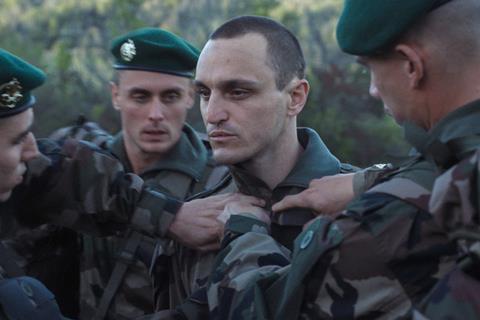Franz Rogowski is a magnetic presence in Giacomo Abbruzzese’s drama about the French Foreign Legion

Dir. Giacomo Abbruzzese. France/Italy/Belgium/Poland. 2023. 92mins
You’ve heard all the jokes about people joining the French Foreign Legion to forget. Here’s a film about a man who is forgotten in the first place – a social outsider variously described as an orphan and a ghost. But Disco Boy is also about his counterpart in Africa, making for mirror play intriguingly sustained in this oblique but aggressive fiction debut by French-based Italian director Giacomo Abbruzzese, following his César-nominated documentary America (2022).
While ’Disco Boy’ doesn’t entirely weave all its threads to satisfying effect, the film crackles with ideas
Dealing with the effects of European industrial and military presence in Africa, but approaching the theme through a formally experimental dream-like optic, this hugely inventive film finally doesn’t deliver all it promises, but highlights Abbruzzese as a distinctive voice. A magnetic lead performance by Franz Rogowski – riding high with Ira Sachs’s Passages and 2022 Cannes hit Great Freedom – will mark Disco Boy’s dance card for festivals and niche outlets with an eye for bold auteur imagination.
A brief African-set prelude is followed by a jump to Eastern Europe, establishing the film’s teasingly indirect narrative approach. Entering Poland on a bus full of football fans are two young Belarusians, Alexei (Franz Rogowski) and Mikhail (Michal Baliki) – but their real destination is France, where they look forward to a life of “Camembert! Crème caramel! La Vache qui Rit!”, as they chant while trying to cross a river. On the road, they pay a lorry driver to blast out their favourite techno music – providing a hint that Alexei is the ‘disco boy’ of the title, although as it turns out, he’s not the only one in this story. In fact, only Alexei makes it to Paris, where – bereft of possessions, ID or foreseeable prospects – he enlists with the Foreign Legion. This institution, we’re shown, is not too fussy about whom it accepts, as long as recruits are fearless, resilient and willing to forget their own pasts, stripping down their selves to become purely “muscles and hearts,” as Alexei’s commander (Leon Lučev) puts it.
Later, the action returns to Nigeria, and a droll sequence in which a news reporter for Vice TV encounters a group of militants from the real-life organisation MEND (Movement for the Emancipation of the Niger Delta). They lay on a ferocious display of gunfire for her, then chuckle about this PR coup de théâtre, before spokesman Jomo (imposing newcomer Morr Ndiaye) makes a video condemning the exploitation of the region by petrochemical companies – illustrated by imposing aerial shots of blasted terrain in which chimneys belch out flames (the island of Réunion standing in as a location for Nigeria).
Jomo’s and Alexei’s paths cross when the latter’s squad is sent to rescue French hostages of MEND. Their encounter is memorably staged in electrically-coloured night vision, with a male body in blazing red suddenly bursting out of a river of icy blue; a sequence recalling the similarly nightmarish recent use of this visual technique in Valentin Vasyanovich’s Ukrainian drama Atlantis to evoke the dehumanising effect of military tech. Back in Paris, Alexei finds himself strangely haunted – with Jomo’s sister Udoka (Laetitia Ky) playing a key part in a hallucinatory final act.
Consistently wrong-footing expectations, Disco Boy makes stylised use of sound and image to alternately pull us into the action and keep us at a perplexed remove, in a mode akin to the methods of French directors such as Bertrand Bonello, Philippe Grandrieux and Claire Denis. Inevitably, Denis’s own Foreign Legion drama Beau Travail is a reference here although, given that film’s massive influence, you sometimes wince at directors signalling the debt too directly, as Abbruzzese arguably does.
While Disco Boy doesn’t entirely weave all its threads to satisfying effect, the film crackles with ideas. With dialogue in multiple tongues including French, Russian and the Nigerian language of Igbo, on one level it’s a commentary about identity in contemporary Eastern Europe, with the film’s Belorussian protagonist identified as rootless, an ‘orphan’, in the post-USSR world. On another, it depicts a military-industrial complex that sets brothers-under-the-skin – twin ‘disco boys’ Alexei and Jomo – against each other.
There are certainly questions to be asked about the fact that Jomo – although he has scenes of highly motivated articulacy that Alexei never attains – doesn’t come into focus to the same degree as the Belorussian, while scenes of dance ritual at Jomo’s village run the risk of exoticising his culture. Nevertheless, the participation of a figure like Ivorian artist and activist Ky would suggest that Abbruzzese has done due diligence in terms of cultural homework.
As for the Legion material, with its homoerotic tinges and overtones of cult programming, there is a certain feeling of familiarity, both from Beau Travail and in Rachel Lang’s more naturalistic Our Men (2021). But the centre of these sequences is always the rootless Alexei – played by Rogowski as an opaque but intense figure, as much body as personality, in a hugely physical, indeed gruelling, performance light years away from his volatile, comic-edged role in Passages (also screening in Berlin).
Pulling out the stops, cinematographer Hélène Louvart –currently on a career roll that includes recent work with Alice Rohrwacher, Alain Guiraudie and Maggie Gyllenhaal (The Lost Daughter) – alternates between rough-edged naturalism, formal composition and hyper-vivid, trance-like imagery, while French composer Vitalic ups the intensity with a score that takes in ominous ambience, dance beats and ferocious machine-gun bursts of electronic noise.
Production company: Films Grand Huit
International sales: Charades sales@charades.eu
Producers: Lionel Massol, Pauline Seigland
Screenplay: Giacomo Abbruzzese
Cinematography: Hélène Louvart
Production design: Esther Mysius
Editors: Fabrizio Federico, Ariane Boukerche, Giacomo Abbruzzese
Music: Vitalic
Main cast: Franz Rogowski, Morr Ndiaye, Laëtitia Ky, Leon Lučev
























